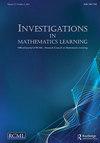Challenges and Benefits of Using Toulmin’s Argumentation Model to Assess Mathematics Lesson Study Debriefing Sessions
Q2 Mathematics
引用次数: 2
Abstract
ABSTRACT As lesson study becomes more prevalent, there is a need to continuously develop theoretical and methodological infrastructure to support and refine its use. In this article, we present a critical methodological analysis of the challenges and benefits of using Toulmin’s argumentation model in mathematics education to assess the debriefing phase of lesson study. During debriefing sessions, teachers offer arguments about how to improve teaching that are grounded in observations of students’ learning. Toulmin’s model provides a means to analyze the structure of such arguments. Using an empirical example, we illustrate challenges of using the model, such as determining appropriate grain sizes for data and claims, evaluating qualifiers, recognizing multiple categories of backing, identifying implicit warrants, and deciding between the individual or the group as a unit of analysis. We also discuss benefits such as being able to systematically compare mathematics teachers’ pedagogical arguments against one another, assess attainment of debriefing session goals, and characterize group discursive dynamics. Despite the challenges of using the Toulmin model, we conclude that it provides a useful framework for systematic analysis of lesson study debriefing sessions. The present article can help researchers anticipate and address challenges of conducting Toulmin-based qualitative analyses of debriefing session discourse.运用图尔敏论证模型评估数学课程学习汇报的挑战与益处
摘要随着课程研究越来越普遍,有必要不断发展理论和方法基础设施,以支持和完善其使用。在这篇文章中,我们对在数学教育中使用图尔明的论证模型来评估课程学习的汇报阶段的挑战和好处进行了批判性的方法论分析。在汇报会上,老师们根据对学生学习的观察,就如何改进教学提出论点。图尔明的模型提供了一种分析此类论点结构的方法。通过一个实证例子,我们说明了使用该模型的挑战,例如确定数据和索赔的适当粒度,评估限定词,识别多个类别的支持,识别隐含担保,以及在个人或群体之间做出决定作为分析单位。我们还讨论了一些好处,例如能够系统地比较数学教师的教学论点,评估汇报会目标的实现情况,以及描述小组话语动态。尽管使用Toulmin模型存在挑战,但我们得出结论,它为课堂学习汇报会议的系统分析提供了一个有用的框架。本文可以帮助研究人员预测和应对对汇报会话话语进行基于图尔明的定性分析的挑战。
本文章由计算机程序翻译,如有差异,请以英文原文为准。
求助全文
约1分钟内获得全文
求助全文
来源期刊

Investigations in Mathematics Learning
Mathematics-Mathematics (all)
CiteScore
2.10
自引率
0.00%
发文量
22
 求助内容:
求助内容: 应助结果提醒方式:
应助结果提醒方式:


